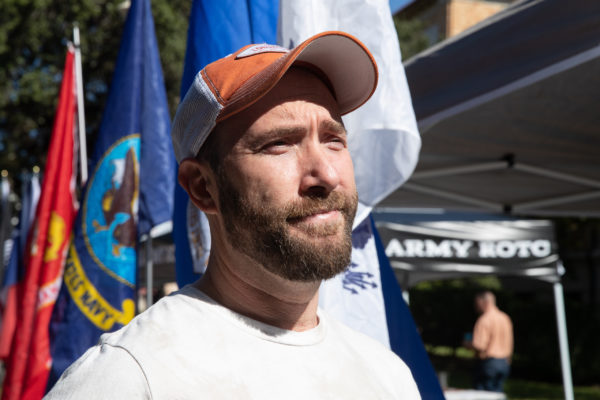Jeffrey Moe knows what it’s like. He has the plaque from his Army unit in his office to prove it.
When student veterans come to talk with him in partnership with Student Veteran Services in the Office of the Dean of Students, Moe — a student veteran coordinator for the U.S. Department of Veterans Affairs representing the nationwide Veterans Integration to Academic Leadership (VITAL) Program — says his experience in the military allows him to better relate to what they might be going through. He can speak their language.
Student Veteran Services Director and Army veteran Jeremiah Gunderson speaks it, too. The pair work together to help student veterans succeed on campus. Some of the services they offer, individually and collectively, include orientation for student veterans, benefits assistance, mental health counseling, academic support and a peer mentoring program.
“We take a more holistic approach to veterans, because in our view, if you don’t address all the issues, then you haven’t addressed the need of the student,” Gunderson says.
In fall 2019, there were 365 veterans receiving military educational benefits at The University of Texas at Austin, according to the university’s Institutional Reporting, Research and Information Systems; additional student veterans who are not receiving benefits are not all tracked by that department.
In addition to supporting these students, Student Veteran Services also provides education and training for staff and faculty members to help them better understand the student veteran experience. This training, offered once a semester, covers academic advising and military culture.
Gunderson says his part focuses on the services his team offers as well as the potential impact of advising on a student’s veteran education benefit eligibility. If a faculty member advises a student to drop a class, for example, it could affect the student’s benefits.
Moe, a licensed clinical social worker, discusses military culture. When veterans come to school, they might face challenges in transitioning to civilian life, he says.
Faculty and staff members might not know that seeking help is frowned upon in the military, Gunderson says, so student veterans might feel reluctant to attend office hours.
Gunderson says texting in a classroom would never translate to a military setting, so veterans might get irritated or distracted by others and choose to sit at the front of the room. However, Gunderson says this can put veterans in an uncomfortable situation because some do not like to sit where things are happening behind them.
Veterans also can face existential crises when coming to campus.
“Why am I here?” Gunderson says they might be thinking. “I was leading troops in Fallujah in the Marine Corps, and now I’m sitting here in a classroom with a backpack, and I just feel silly.”
The biggest misconception Moe says he sees is people attributing problems veterans have to post-traumatic stress disorder or brain injury.
“I’d say this about every student, but just don’t assume anything” about students with a military background, Moe says. “They have some diverse experiences. Not all of them are combat veterans. Not all of them want to be identified as veterans.”
For a while, the only VITAL Program in Texas was at UT. During the past few years, Moe has helped support his VA leadership to expand the program to other area schools.
“I think it’s an important program because it really brings VA services to the veterans so they can get those services on campus,” Moe says.




